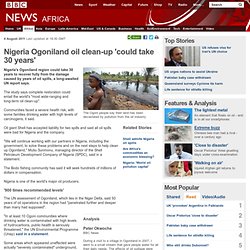

India examines cost of mining more closely. Citing the need to protect the environment and local residents, Indian courts and government bodies have started blocking – or even cancelling – a growing number of industrial projects. Last month the high court in Madras ordered the closure of a copper smelter operated by the London-listed mining conglomerate Vedanta, to protect "mother nature" from "unabated air and water pollution". In August, the environment ministry prevented Vedanta from opening a bauxite mine on tribal lands in eastern India held to be sacred by the Dongria Kondh community. Economic benefit is no longer sufficient reason for the government to approve applications for mining and industrial schemes. The EPA: the Tea Party's next target. You'd think Congress would be too busy wrecking the economy to attack the environment.

Yet, in the midst of a packed schedule snapping at President Obama's heels and lunging for each other's throats, Republicans have found time to try and rip the heart out of the Environmental Protection Agency, killing 40 years of protections for water, air, endangered species, wildlife habitat and national parks. Population to Bulge, But Will Hit Ceiling. Speculation on population numbers raise questions about whether the planet can sustain us all.

The world's population is expected to hit seven billion this year. By 2100, there will likely be more than 10 billion people living on Earth. After 2100, the population level will probably plateau. The world's population is on track to hit seven billion this year, which is double the number of people that lived on Earth in the 1960s, but far from what the future holds. By 2100, according to recent projections by the United Nations, we'll hit the 10 billion mark.
What future for our national parks? Parks Canada celebrates its 100th anniversary this year, and Canadians have much to be proud of.

The planet's oldest national parks service has established a reputation as one of the best; its conservation practices are studied and imitated the world over. Yet its first priority, “to protect the natural and cultural heritage of our special places and ensure that they remain healthy and whole,” has never been more important. So what should it do next – not so much so that we can enjoy our lands and waters, but so that they can simply continue to exist? Above all, Parks Canada should accelerate its sound plan to establish a national park in each of Canada's 39 “terrestrial regions.” Today, only 28 of them have such parks. Nigeria Ogoniland oil clean-up 'could take 30 years' 4 August 2011Last updated at 19:30 GMT The Ogoni people say their land has been devastated by pollution from the oil industry Nigeria's Ogoniland region could take 30 years to recover fully from the damage caused by years of oil spills, a long-awaited UN report says.

The study says complete restoration could entail the world's "most wide-ranging and long-term oil clean-up". Communities faced a severe health risk, with some families drinking water with high levels of carcinogens, it said. American Zoos Help Return Condor To South America. In the high Andes of South America, one of the world's great birds is making a comeback.

The condor is returning from the brink of extinction, thanks to a program in which condor chicks are raised in American zoos and then released in the wild. Success, though, depends on the cooperation of farmers and shepherds — and in one special case, a group of Colombian army soldiers assigned to a rocky cliff. hide captionAn Andean condor sits perched on a fence in central Colombia. A new program in which American-bred Andean condors are introduced into the wild has helped replenish Colombia's once rich condor population. Olga Nunez/Fundetropico Foundation. Water use in China and the Middle East is an environmental Ponzi scheme.
Children of the revolution ... water bottles are brought on to a housing complex in Beijing, China.

Photograph: Diego Azubel/EPA Find water and you find life. This simple maxim guides scientists searching distant planets for aliens. But if the astrobiologists were to reverse their telescopes and look at our own globe, they would find a conundrum: billions of people living in places with little or no water. That unsustainable paradox is now unravelling before our eyes in the Middle East and north Africa. Ogoniland Oil Assessment Reveals Extent of Environmental Contamination and Threats to Human Health. Abuja, 4 August 2011 - The environmental restoration of Ogoniland could prove to be the world's most wide-ranging and long term oil clean-up exercise ever undertaken if contaminated drinking water, land, creeks and important ecosystems such as mangroves are to be brought back to full, productive health.
A major new independent scientific assessment, carried out by the United Nations Environment Programme (UNEP), shows that pollution from over 50 years of oil operations in the region has penetrated further and deeper than many may have supposed. The assessment has been unprecedented. Over a 14-month period, the UNEP team examined more than 200 locations, surveyed 122 kilometres of pipeline rights of way, reviewed more than 5,000 medical records and engaged over 23,000 people at local community meetings.